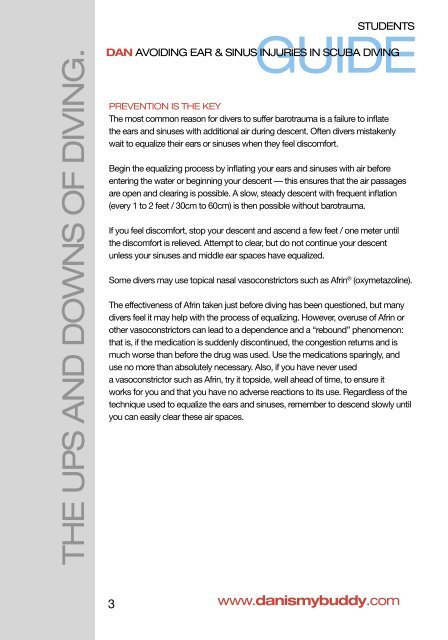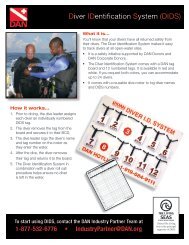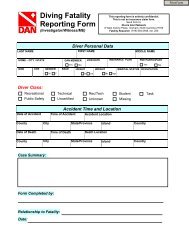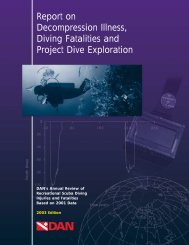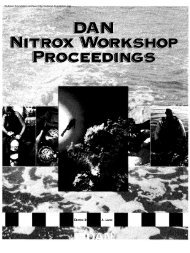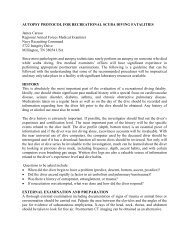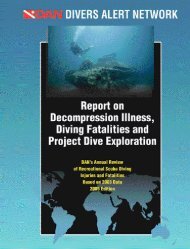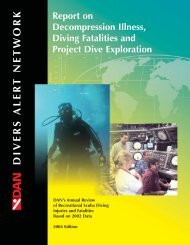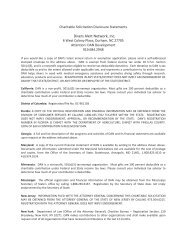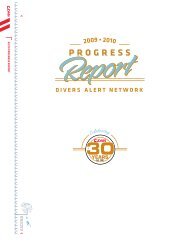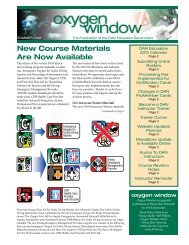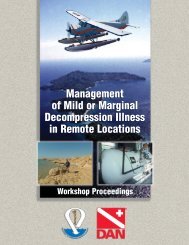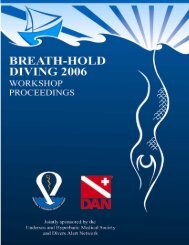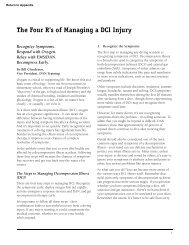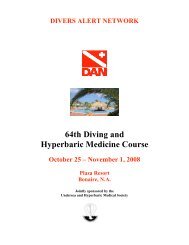dan avoiding ear & sinus injuries in scuba - Divers Alert Network
dan avoiding ear & sinus injuries in scuba - Divers Alert Network
dan avoiding ear & sinus injuries in scuba - Divers Alert Network
You also want an ePaper? Increase the reach of your titles
YUMPU automatically turns print PDFs into web optimized ePapers that Google loves.
THE UPS AND DOWNS OF DIVING.<br />
STUDENTS<br />
GUIDE<br />
DAN AVOIDING EAR & SINUS INJURIES IN SCUBA DIVING<br />
PREVENTION IS THE KEY<br />
The most common reason for divers to suffer barotrauma is a failure to <strong>in</strong>flate<br />
the <strong>ear</strong>s and <strong>s<strong>in</strong>us</strong>es with additional air dur<strong>in</strong>g descent. Often divers mistakenly<br />
wait to equalize their <strong>ear</strong>s or <strong>s<strong>in</strong>us</strong>es when they feel discomfort.<br />
Beg<strong>in</strong> the equaliz<strong>in</strong>g process by <strong>in</strong>flat<strong>in</strong>g your <strong>ear</strong>s and <strong>s<strong>in</strong>us</strong>es with air before<br />
enter<strong>in</strong>g the water or beg<strong>in</strong>n<strong>in</strong>g your descent — this ensures that the air passages<br />
are open and cl<strong>ear</strong><strong>in</strong>g is possible. A slow, steady descent with frequent <strong>in</strong>flation<br />
(every 1 to 2 feet / 30cm to 60cm) is then possible without barotrauma.<br />
If you feel discomfort, stop your descent and ascend a few feet / one meter until<br />
the discomfort is relieved. Attempt to cl<strong>ear</strong>, but do not cont<strong>in</strong>ue your descent<br />
unless your <strong>s<strong>in</strong>us</strong>es and middle <strong>ear</strong> spaces have equalized.<br />
Some divers may use topical nasal vasoconstrictors such as Afr<strong>in</strong> ® (oxymetazol<strong>in</strong>e).<br />
The effectiveness of Afr<strong>in</strong> taken just before div<strong>in</strong>g has been questioned, but many<br />
divers feel it may help with the process of equaliz<strong>in</strong>g. However, overuse of Afr<strong>in</strong> or<br />
other vasoconstrictors can lead to a dependence and a “rebound” phenomenon:<br />
that is, if the medication is suddenly discont<strong>in</strong>ued, the congestion returns and is<br />
much worse than before the drug was used. Use the medications spar<strong>in</strong>gly, and<br />
use no more than absolutely necessary. Also, if you have never used<br />
a vasoconstrictor such as Afr<strong>in</strong>, try it topside, well ahead of time, to ensure it<br />
works for you and that you have no adverse reactions to its use. Regardless of the<br />
technique used to equalize the <strong>ear</strong>s and <strong>s<strong>in</strong>us</strong>es, remember to descend slowly until<br />
you can easily cl<strong>ear</strong> these air spaces.<br />
3<br />
www.<strong>dan</strong>ismybuddy.com


